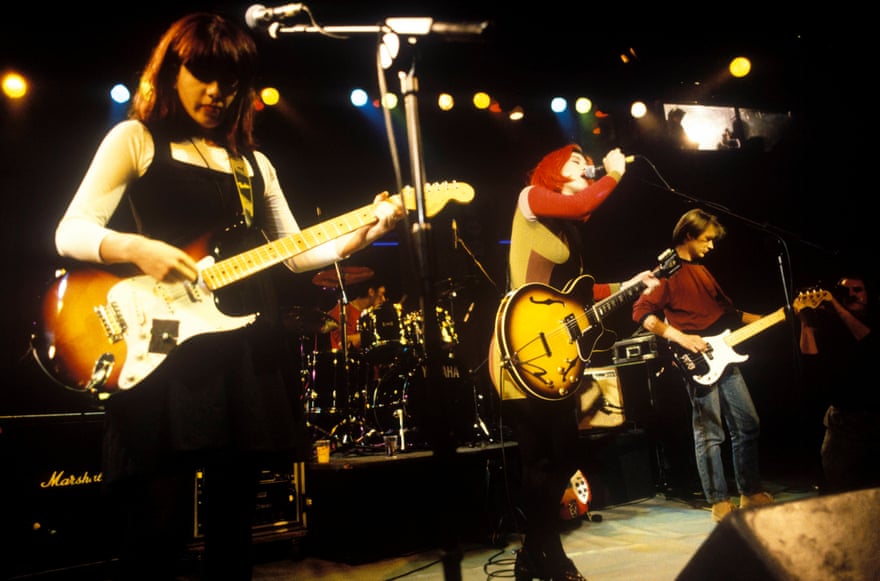When Miki Berenyi thinks of Britpop, certain memories stand out – such as the night at Soho House in London when Alex James from Blur sank his teeth into her bum. “I object to this idea that Britpop was fucking amazing,” says the lead singer of Lush, dragging on her vape at her kitchen table in Willesden, north London. “Don’t get me wrong. I’d been there, jumping up and down to Girls and Boys. Some of the music was great. But Britpop was a monoculture. Every scene has an underbelly, but there was no room for any other story. Of course, you can’t say that, because people will go: stop being such a killjoy, you’re only saying that just because Lush weren’t popular – which I have conceded!”
Berenyi, 55, has a disarming self-possession with a fizzing energy just below the surface. She fronted Lush with Emma Anderson – they had bonded at school over the Thompson Twins and a shared filthy sense of humour – and they wrote their own songs, contrary to the assumptions of many journalists at the time. They emerged from the shoegaze scene in the late 80s and were signed to 4AD. Their lyrics were smart: Ladykillers was a kiss-off to Red Hot Chili Peppers’ Anthony Kiedis, who Berenyi says tried to take her to a strip club (“He didn’t do anything terrible – he was just a bit of a twat”). But then they were swept up in ladette culture. One day in 1996, Berenyi found herself being photographed bent over a toilet, legs splayed, being told to look seductively back at the camera.
“I don’t think Cocteau Twins or Throwing Muses were asked to get their kit off and pose in a swimming costume,” she says. “I’m pretty sure Liz Fraser was never asked to get down to her undies. I could see the trap in the ladette thing. It was saying: it’s all about liberation, it’s all about girls doing what they want – if they want to get their tits out, or watch football or drink beer, that’s great. The problem is for anyone who doesn’t feel confident enough to go out in a fucking negligee. And the girl that does, I can guarantee that she’s going to get a shitload of crap.”
Chaotic promo tours and a manager no one liked added to the sense of something unravelling, and Lush quit in early 1997, devastated by the suicide of their drummer, Chris Acland. Berenyi enrolled on a proofreading course and was offered a job subbing TV listings on the ninth floor of King’s Reach Tower in Southwark, south London, the same building that housed NME. She would meet rock journalists in the lift: “I could sense their discomfort when they recognised me.” But she loved the sociability of office life – the same reason she liked being in a band. She remained in similar jobs, raising two children with her partner, the musician “Moose” McKillop, until she was made redundant after the pandemic and decided to have a crack at writing a book.
“The thing is, I didn’t know if anyone would really give a shit about Lush,” she says. “And I don’t really read a lot of rock bios, and the ones I like aren’t that much about rock …” Many of the most interesting music narratives of the last few years have been written by women who never thought they had it in them. Their stories are more valuable than the traditional rock’n’roll yarns, and Berenyi’s story is odder than most.

These suburban Willesden streets are the kind that gave rise to countless pop dreams for musicians of Berenyi’s generation, forged mainly from a desire to escape. Yet hers was a wild childhood and a lifelong search for normality has kept her rooted here: she lives just a bus ride from her old family home. Her Japanese mother was an actor (she is one of the geisha girls lathering James Bond in a whirlpool bath in You Only Live Twice) who moved in with Cary Grant’s stunt double and parented remotely from the other side of the Atlantic. Her late father was an adored but destructive Hungarian dissident: on thousand-mile drives back to the motherland, he would cover petrol costs by making his nine-year-old daughter sell cassette tapes on the streets of eastern bloc countries; in London, he would occasionally take her clubbing, and use her as bait to attract girls on the dancefloor. By the time she was 14, she was sleeping on a camp bed in the eaves of her school.
And then there was Grandma Nora, fallen from a good life under the Nazis when the Russians invaded Hungary, shipped over to Willesden when Berenyi’s mother moved out. Nora, sipping on Advocaat, making her granddaughter walk on the outside of the pavement to take the potential impact of any passing car, sharing her bed – and subjecting her to years of sexual abuse, which Berenyi later assumed was her own fault. “Sometimes I stare at the toothless cavity of her mouth, fallen open as she snores,” she writes, “and I want to shove my fist inside until she chokes.”
Berenyi’s book recreates the mental landscape of a neglected child with astonishing detail and uncovers new truths about the kind of impulses that drive a teenager to carve out a life in bands. She developed an array of childhood tics, such as pushing her eyeballs in with her fingers: an early introduction, she explains, to self-harm and being in control of her own pain. Today, she wears a sleeveless top and many old, self-inflicted scars are visible on her forearm.

She was a people-pleaser, tough but clingy and terrified of being alone. “I’ve always defined myself as quite wishy washy,” she offers. “Charlie Brown is my ideal childhood character. Whereas Emma would be Lucy van Pelt …” (Berenyi and Anderson – who is frequently characterised in the book as “moany” – no longer talk, since a 2016 Lush reunion proved their lifelong differences irreconcilable.) But a cool reasonableness hangs over Berenyi: her obsession with weighing up both sides of any story was useful for an indie band being put in compromised positions. It was a coping trick that began in childhood – she considers kicking her grandmother down the stairs but thinks better of it because she doesn’t want the juvenile detention sentence.
“One of my pet hates is the idea of going through life feeling like a victim, waiting to be bruised by everything, and on the lookout for harm,” she says. “I’ve had people react to my childhood and say: ‘God, I can’t believe that that social worker came around and saw the state of the place, and didn’t recommend you to be put into care.’ What, and that would have been better, to grow up in care?”
There was no love lost when granny died. Much of Berenyi’s shame and confusion came from the fact that she would reciprocate her grandmother’s advances to please her, acting out love scenes she had seen in films (detail in the book is kept to a minimum). “When I did talk to friends, I would up the outrage,” she says. “I never would have admitted that there were times when I actually instigated it. Because people would think I was the bad seed, and Nora wasn’t the abuser at all.”
As an adult, Berenyi struggled with fidelity and had a reputation for sleeping around. She had many famous boyfriends, including Billy Childish, who was still with Tracey Emin at the time. “Even in Britpop there was moral judgment,” she says. “We’re expected to be having it large or whatever, but we’re still getting called slags behind our backs.”
That said, much of it was tremendous fun. In bands, she found the constant company she craved; with her image, she made a feature of her innate difference: “If I was stared at, I could tell myself they were reacting to the clothes, the hair, the makeup. The stuff I’d put on deliberately,” she writes. “Not the girl I couldn’t help being inside the disguise.” She passes gruelling US tours in a state of wonder, sitting upfront with the driver all night on the bus. She is endlessly thrilled by the famous people she meets, even when she’s quite famous herself. But Britpop felt mean, like the playground of one of her many primary schools. And it homogenised what was interesting about British music in the years leading up to it, she now thinks.

“When shoegaze happened, you also had Manchester, and baggy, all these different things,” she says. “People could be tribal but they coexisted. Britpop knocked the interesting corners off bands – even with Pulp, who I really did love. Jarvis had a self-deprecating manner, the songs were romantic, they reminded me of the Kinks, touching and awkward. But all the stuff that I found charming about Pulp got swept away. I could see it happening in the attitude and the sneer. Everyone thought Common People was great. The song that is having a rant at some girl is the one everyone loves most.”
Lush folded after their most successful album, Lovelife, following wrongheaded attempts to break America and a steady drop in morale. In 1997, journalists connected Acland’s death with the band’s changing fortunes – another thing that sets their story in more primitive times. “What those obituaries taught me was, unless you’re a mental health professional, keep your asinine assumptions to yourself,” says Berenyi. “Because all the people who were close to him, and his family, none of us has come up with an answer, and we knew him better than anybody.”
Had Acland not died, Berenyi says: “I wonder what state I would have ended up in before I thought: I really need to get out of this.” The book she didn’t think she had it in her to write is subtitled: “How music saved me from success.” As a subeditor she led a less glamorous life but believes she lucked out: “6pm, job done.” It paid twice as much as Lush ever did, too.
Stay connected with us on social media platform for instant update click here to join our Twitter, & Facebook
We are now on Telegram. Click here to join our channel (@TechiUpdate) and stay updated with the latest Technology headlines.
For all the latest Music News Click Here
